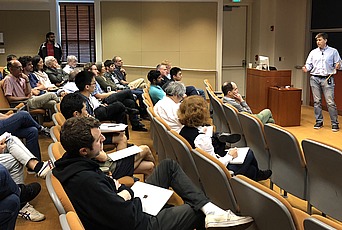
Matias Zaldarriaga Receives Gruber Cosmology Prize
The Gruber Foundation and International Astronomical Union (IAU) has announced that Matias Zaldarriaga, Richard Black Professor in the School of Natural Sciences, is a recipient of the 2021 Gruber Cosmology Prize. Zaldarriaga shares the honor with Marc Kamionkowski—a past Member in the School (1991–95), currently at Johns Hopkins University—and Uroš Seljak of the University of California at Berkeley and Lawrence Berkeley National Laboratory
The selection committee cited the trio “for their work on the Cosmic Microwave Background, the most direct tracer of the primordial universe and of its physics. Their theoretical predictions and analysis tools for the cosmic background, its intensity, and even more its polarization, have been essential to the development of this field of research over the last twenty-five years, already testing predictions of the inflation model for the early expansion of our universe. Furthermore, their work has been key to initiating new observation projects extending over the next fifteen years, in the quest for detecting the imprint of primordial gravitational waves on the microwave background.”
The cosmic microwave background (CMB), an echo from the Big Bang itself, is a weak signal that pervades space in every direction. The CMB provides researchers with a glimpse of the infant universe, when it was approximately 379,000 years old.
The work of Kamionkowski, Seljak, and Zaldarriaga has revolutionized the way researchers analyze the CMB, unlocking many deep mysteries of the universe. The concepts outlined in two independent but contemporaneous papers (Kamionkowski, 1997) and (Seljak and Zaldarriaga, 1997), provide a mathematical means to infer the history of the Universe all the way back to the first fraction of a fraction of a second of the universe’s existence.
The influence of Kamionkowski, Seljak, and Zaldarriaga has touched nearly every major area of cosmology research, including the early expansion of the universe, its age and composition, and primordial gravitational waves. Around this time, Seljak and Zaldarriaga also developed open-source codes capable of making the predictions required to analyze CMB data thousands of times faster, which supercharged CMB research for years to come.
A prize ceremony will take place in August at the 24th International Conference on Particle Physics and Cosmology (COSMO'21) at the University of Illinois and online.
The Gruber International Prize Program honors individuals in the fields of Cosmology, Genetics, and Neuroscience whose groundbreaking work provides new models that inspire and enable fundamental shifts in knowledge and culture. The Selection Advisory Boards choose individuals whose contributions in their respective fields advance our knowledge and potentially have a profound impact on our lives.
The Gruber Foundation was established in 1993 by the late Peter Gruber and his wife Patricia Gruber. The Foundation began its International Prize Program in 2000, with the inaugural Cosmology Prize.
Read more at the Gruber Foundation or at the IAU.


